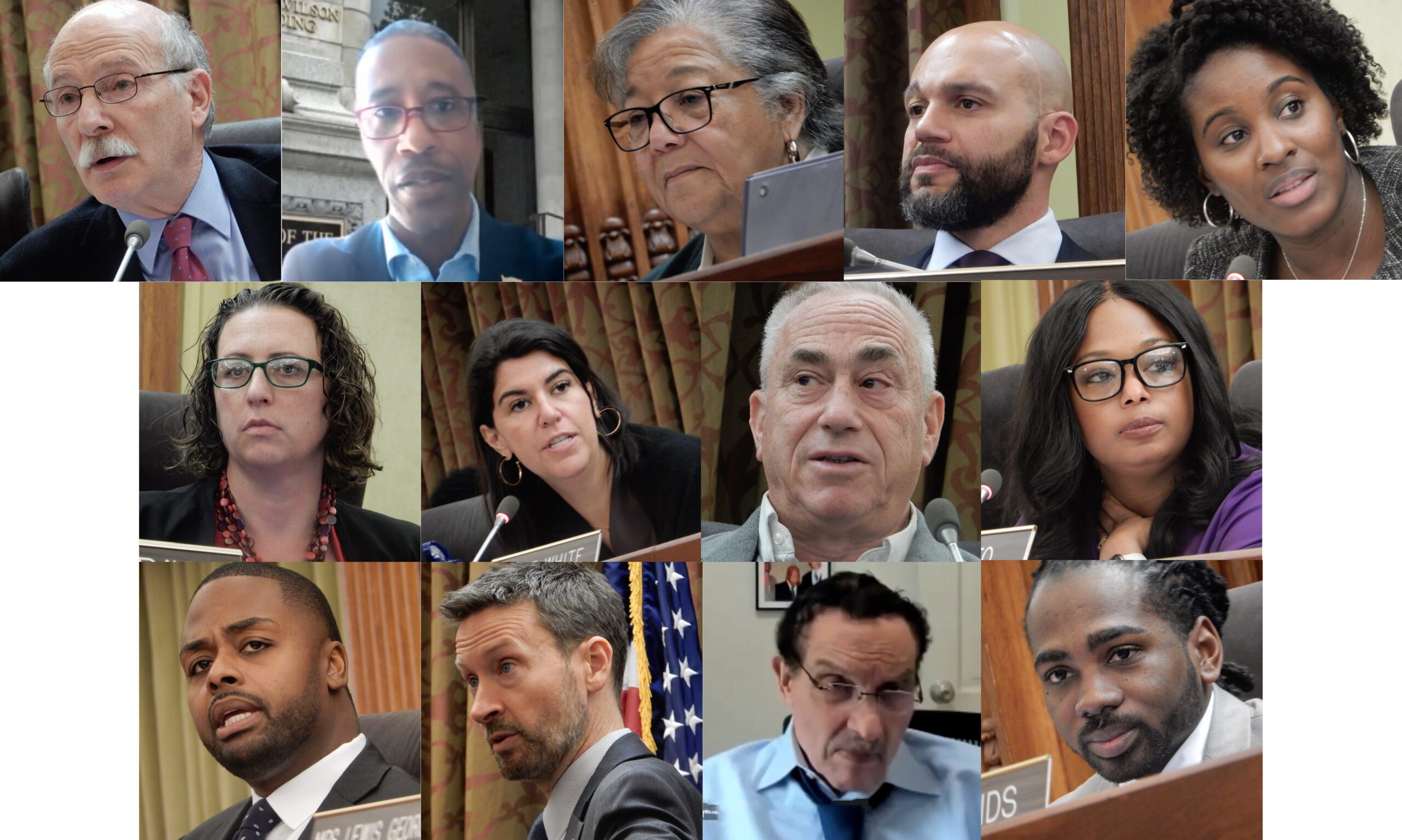Council Acts on 911 Hiring, Wage Measures, School Work Orders, and Streateries

With 2023 in its waning days, not only is the New Year approaching, but with it, the halfway point of Council Period 25 (2023-2024), At year-end in the even-numbered years that mark the second of two years in a Council Period cycle, an urgent deadline prompts hasty action—any legislation not passed by the end of a Council Period must re-start the legislative process from scratch the following year. (In odd-numbered years like this one, the urgency of action remains, just without the artificial year-end deadline.)
911 Reform
At the Council’s most recent Legislative Meeting, the Council again took action to improve the efficiency and performance of the District’s 911 system. Back in July, the Council passed emergency legislation requiring the Office of Unified Communication (OUC), which runs DC’s 311 and 911 systems, to provide monthly public reports via its website on the numbers of calls taken, dispatch times, dispatcher errors, and calltaker shifts with sub-par staffing. A permanent version of this measure has also been introduced.
Targeting specifically the number of understaffed call-taking shifts, another emergency bill passed at the most recent meeting would allow retired police officers and firefighters to be hired as temporary OUC call-takers or dispatchers without jeopardizing their retirement benefits. The goal of the legislation is not just to deal with hiring shortages, but to generate OUC new hires who are already intensely familiar with the District’s 911 dispatch system.
Additional measures have been introduced to further reform and improve the District’s 911 system, and if they are approved by the Council, they will be discussed in this space.
Wage Measures
At its most recent meeting, the Council also approved (in the first of two necessary votes) two measures dealing with wages. One expanded the District’s minimum wage law so that it applies to any employees who work two or more hours in the District in a single workweek. The prior version of our minimum wage legislation applied only to workers who worked over 50 percent of their weekly hours in the District, which led to situations where employers with numerous job sites could skirt paying the minimum wage in DC by splitting employee work hours between a DC and non-DC workplace.
The second wage measure passed by the Council (again in the first of two needed votes) was an omnibus (combo) bill that consolidated three previously introduced measures that all addressed wage disclosure and fairness. The bill would prohibit employers with 25 or more District employees from requesting a potential employee’s wage history or screening them on that basis, it would require employers to post minimum and maximum salary/wage information in all job postings, and it would require employers to provide a full list of job benefits to job applicants prior to their first interview.
School Work Order Integrity
Also at the most recent meeting, the Council passed (on the first of two needed votes) a measure to verify that if a needed school repair is marked as “complete” in the government’s task management system, it truly is complete.
As anyone who has called 311 or placed a service request on the 311 app knows, just because a complaint gets marked as “complete” in the system does not necessarily mean that the work has truly been completed, let along completed satisfactorily.
Such was often the case when schools placed repair requests with the Department of General Services (DGS), the DC government’s real estate arm. Under the new system, in order for DGS to mark a work order as “closed,” a representative from the school in question must have verified the work was truly done, done well, and signed off on that fact. If DGS reports internally that a task is done, but the school has not signed off on it yet, DGS must inspect and verify that the work was in fact truly and satisfactorily done before closing the request.
Streateries
Necessity is the mother of invention, and throughout history, “fixes” that have arisen during times of crisis have often proven durable and worthy of keeping around even after the crisis has passed. For example, the idea of staggered work shifts was born from an effort to reduce streetcar crowding during the Spanish Flu pandemic of 1918, but the flexibility it provided to both workers and employers proved popular, and the practice persists to this day.
In a similar category are the District’s streateries. Born from necessity during the COVID pandemic, when indoor dining was not allowed, this transformation of public space from parking to outdoor dining use has also proven quite popular and will live on into the future. What is at question are the specifics of the post-pandemic streatery. The Council has now once again extended the expiration of COVID-era streateries into 2024, with hopes that the long-anticipated permanent regulations for post-COVID streateries will finally be forthcoming.
Congressional Review Emergencies
In closing, it is worth noting that at the most recent meeting, the Council had to pass nine “Congressional Review Emergency” measures. Sadly, all temporary and permanent Council legislation must be sent to the Capitol for Congressional review before becoming law. These review periods are based not on calendar days or even weekdays, but Congressional work days. With fewer of these per year than ever, gaps occur between the effective dates of our short-term “emergency” legislation (which requires no Congressional review), intermediate-term “temporary” legislation, and permanent legislation.
As a result, much excess labor and paperwork are required as the Council must pass these “Congressional Review Emergency” bills to prevent gaps in legislation being in effect. Of the nine “Congressional Review Emergency” measures the Council passed at the most recent Legislative Meeting, two were “Second Congressional Review Emergencies,” meaning we needed to turn to this cobbled-together, gap-filling device not once but twice!
The Council’s next regularly scheduled Legislative Meeting will be held on January 9, although another meeting could be scheduled in two weeks.